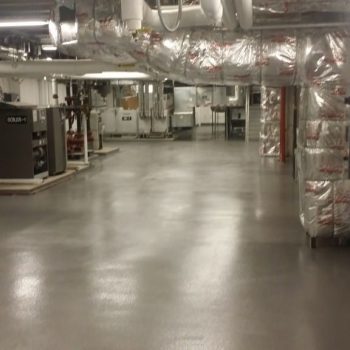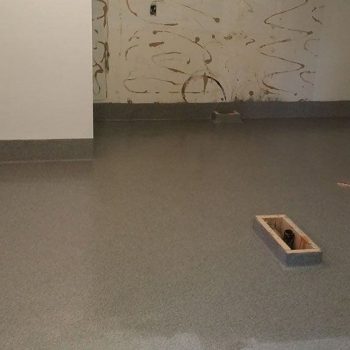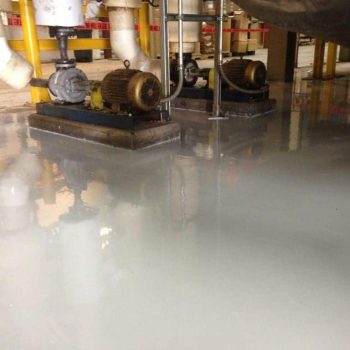Food Processing Epoxy Flooring
Issues
Epoxy coating meets USDA and other federal regulations and can be installed in any facility with minimal interruption to the food processing and distribution operations.



Requirements
Federal Regulations
We know that the food processing industry is strictly regulated and has to meet federal government standards. Because these federal laws are formulated to ensure that food processing facilities have flooring that is durable and meet hygienic standards, that flooring must also be capable of handling regular foot traffic and harsh conditions.
Any foodservice application flooring needs to be quick and easy to clean and meet USDA regulations for seamless flooring that reduces bacteria and mold growth. Our installations meet these regulations even those that require the use of integral, sanitary cove base where flooring meets walls with a radius that helps with cleaning these areas that are particularly prone to bacteria growth
Epoxy flooring also answers the need to handle those incidents that occur when actually processing and working with food products. Keeping all areas of a food processing industry clean is a critical for meeting regulations. During processing, certain food byproducts can end on the floor – examples include fats, oils, blood, sugar, and acids – so epoxy flooring makes meeting the cleanliness issue easier.
Cleaning
Maintaining cleanliness involves having the correct type of floor coatings to support easy and efficient cleaning. Epoxy coating is ideal for deal withing potentially corrosive liquids and fluids and be able to withstand regular high-pressure cleaning and thermal shock.
Tough Conditions
Meat packing facilities, which contain frigid freezers and walk-in coolers, require flooring that can handle extreme hot and cold temperatures. Commercial kitchens – including those in cafeterias-and wineries – must be able to handle the acids contained in oils, sugars, and even dairy products, which can break down lesser floor coatings and may require urethane cement rather than epoxy.
Al these facilities need flooring that also naturally possesses stain-fighting capabilities and provides skid/slip protection. The flooring has to help prevent the development of nasty odors, especially those which can be absorbed into food products, make them unfit for consumption and necessitate waste disposal.
Thermal Shock Resistance
Daily maintenance in food processing facilities includes washing floors with very hot water or steam to remove blood, grease, and chemical contaminants from the surface of the floor. Most plants operate at cooler temperatures, so the floor will be subjected to thermal shock – where the cool floor is suddenly exposed to temperatures at 180 degrees F or more.
Ordinary floor materials may not be able to handle these drastic temperature changes and can crack or separate. Thermal shock resistant flooring surfaces, such as urethane cement, can withstand thermal shock from these extreme temperature fluctuations and are often resistant to vapor transmission rates of up to 20 pounds.
Temperature Variation During Application
Temperatures vary in any food processing location. One part of the facility can have cool or cold extremes while other areas are warm or even hot conditions. The floor coating must be structured to handle both hot and cold temperatures, while curing as well as when it is in regular production use.
Philadelphia Epoxy Flooring has the experience and the processes to efficiently install food processing floors that are tough and engineered to last for years.
Our food industry flooring installations:
Provide for uninterrupted production and prevent downtime for replacements and repairs
Are tough enough to resist abrasions from carts, forklifts, and other heavy machinery
Help avoid possible liability issues because it is engineered to be slip-resistant, so fast-moving employees are less likely to get injured from falls and slips
